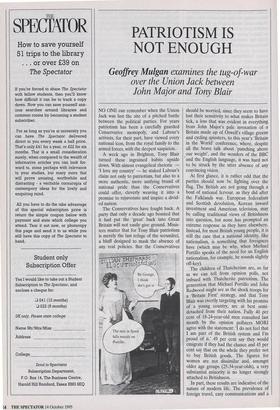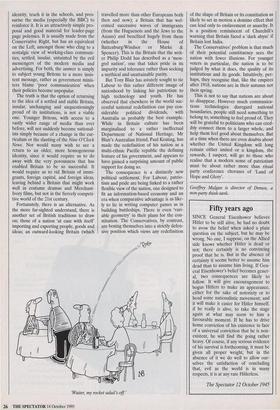PATRIOTISM IS NOT ENOUGH
Geoffrey Mulgan examines the tug-of-war
over the Union Jack between John Major and Tony Blair
NO ONE can remember when the Union Jack was last the site of a pitched battle between the political parties. For years patriotism has been a carefully guarded Conservative monopoly, and Labour's activists, for their part, have viewed every national icon, from the royal family to the armed forces, with the deepest suspicion.
A week ago in Brighton, Tony Blair turned these ingrained habits upside down. With almost evangelical rhetoric 'I love my country' — he staked Labour's claim not only to patriotism, but also to a more authentic, more unifying brand of national pride than the Conservatives could offer, cleverly weaving it into a promise to rejuvenate and inspire a divid- ed nation.
The Conservatives have fought back. A party that only a decade ago boasted that it had put the 'great' back into Great Britain will not easily give ground. Minis- ters mutter that for Tony Blair patriotism is merely the last refuge of the scoundrel, a bluff designed to mask the absence of any real policies. But the Conservatives should be worried, since they seem to have lost their sensitivity to what makes Britain tick, a loss that was evident in everything from John Major's pale invocation of a Britain made up of Orwell's village greens and cycling spinsters, to this year's 'Britain in the World' conference, where, despite all the brave talk about 'punching above our weight', and the wonders of the BBC and the English language, it was hard not to be struck by the utter absence of any convincing vision.
At first glance, it is rather odd that the parties should now be fighting over the flag. The British are not going through a bout of national fervour, as they did after the Falklands war. European federalism and Scottish devolution, Korean inward investment and American television, may be calling traditional views of Britishness into question, but none has prompted an extreme response as they have elsewhere. Instead, for most British young people, it is still the case that a national identity, like nationalism, is something that foreigners have (which may be why, when Michael Portillo speaks of the need for an English nationalism, for example, he sounds slightly off-key). The children of Thatcherism are, so far as we can tell from opinion polls, not imbued with Thatcheritc patriotism. The generation that Michael Portillo and John Redwood might see as the shock troops for a 'Britain First' strategy, and that Tony Blair was overtly targeting with his promise of a young country, are at best semi- detached from their nation. Fully 40 per cent of 18-24-year-old men consulted last month by the opinion pollsters MORI agree with the statement: 'I do not feel that I am part of the British system and I'm proud of it.' 49 per cent say they would emigrate if they had the chance and 45 per cent say that on the whole they prefer not to buy British goods. The figures for women are not dissimilar and, amongst older age groups (25-34-year-olds), a very substantial minority is no longer strongly attached to Britishness.
In part, these results are indicative of the nature of modern life. The prevalence of foreign travel, easy communications and a cosmopolitan culture make the traditional fixities of 19th-century nationhood look naive and unnecessarily restrictive. For a generation that has been brought up on Japanese consumer electronics and cars, and that has learnt to see Japanese employers as often far superior to British ones, slogans like 'I'm backing Britain' ring hollow.
But these figures also reflect something more immediate. British identity has always been tightly bound up with its insti- tutions, with the standing and success of the monarchy, parliament and the rule of law. When these are seen to fail, as they have been in recent years, their failure rubs off on the nation in a way that would not happen with nations that define them- selves by their landscape, their religion, or indeed their status as victim. Judges who convict the innocent, princes who deviate from family morality, and a parliament that sometimes owes more to West End comedy than sober deliberation, have all played their part.
It would be easy to conclude that politi- cians should simply forget about the nation. But this would be unwise. For none of the other potential vessels of identity is sufficiently strong. Only 6.5 per cent of MORI's 18-34-year-olds feel 'really enthu- siastic about Europe' and only 3.5 per cent are 'completely against it' (suggesting that much of the vitriol of the current debate is seen as irrelevant). Nor are any of the other candidates for loyalty particularly robust: Scottishness may be again in the ascendant, fuelled by the Hollywood romanticism of Braveheart, but regional identity remains remarkably weak in Eng- land (as the Local Government Commis- sion demonstrated), and the fashionable `virtual communities' of the Internet remain the preserve of well under 1 per cent of the population.
This is why it is shrewd of Tony Blair to shift the battleground. Instead of arguing —• as Labour once did — against any kind of national identity, he is arguing instead about what kind of nation Britain is to be. One of the virtues of this switch is that it opens up again much that appears fixed and immutable. It reminds us that British- ness has repeatedly been reinvented and recast to suit the needs of the moment.
Much of the best recent account of how this was done in the past is Linda Colley's Britons, which details how in the 18th cen- tury, a sense of Britishness was consciously forged, first to integrate the Scots, Welsh and English against Catholicism and conti- nental Europe, and later to share the spoils of Empire. This successful redesign gave us both the national anthem and the Union Jack (which was first used in 1801). Even more successful, however, was the later reinvention of Britishness under the Victorians, who defined a parallel identity around the idea that Britain has been blessed with an unmatched continuity, a united nation led from the playing fields of Eton whose soul resided in England's idyl- lic village greens.
No matter that the image bore little relation to the great mills and cities on which Victorian strength rested, and no matter that the central institutions of par- liament and monarchy had gone to war with each other, or that the royal family had not been meaningfully English since the 11th century. The important point was that the images felt comfortable and appropriate as the nation grew to world leadership. Edmund Burke once wrote that all com- munities are fictions, and the same is true of nations. What matters is whether the fictions work, not whether they are true. Today the past success of these ideas of Britishness means that they seem natural and ancient. We project them proudly to foreigners. Until recently, for example, the company which then called itself British Airways welcomed incoming business-class visitors with a video offering a perfect amalgam of this invented identity, with a seamless flow of rolling green hills, and images of the Tower of London and Shakespeare, but nothing after 1850: no industry, no technology and certainly no coloured faces.
It is this familiar and much-loved identi- ty that now needs updating. For it now has the smell of age and decline. It feels like a waning asset, and in almost every walk of life the old identity is losing its utility. The Westminster Parliament is a good example. In the 1950s and 1960s it was taken as a model by the new democracies. By con- trast, it has been almost completely ignored by the new democracies of the 1990s. Much the same problem is apparent in the busi- ness world. British Airways is now BA, British Petroleum, BP, and British Telecom is BT. All have dropped the word 'British' on the grounds that it is now a barrier to doing business, rather than a hallmark of quality.
This loss of faith is widely shared. In many of our cities, sociologists tell us that the white working class are less sure of their identity than any other group, and there are even confusions about what the nation is called. Sometimes it is the United Kingdom, sometimes it is Great Britain, and still to many foreigners it remains Eng- land. In football there are four countries including Northern Ireland; in Rugby Union there are four 'home' countries (including the whole of Ireland) who play together overseas as the British Lions; in athletics there is the Great Britain team as there is in Rugby League, even though the majority of players in the latter are drawn from a couple of counties in the north of England.
One simple response to all of these signs that national identity is unravelling is to argue that we should rebuild our older identity, teach it in the schools, and pres- surise the media (especially the BBC) to reinforce it. It is an attractively simple pro- posal and good material for leader-page page polemics. It is usually made from the Conservative Right, but has an equivalent on the Left, amongst those who cling to a nostalgic view of working-class communi- ties, settled, insular, untainted by the evil messengers of the modern media and advertising. For both, the answer is simply to subject young Britons to a more insis- tent message, rather as government minis- ters blame 'poor communication' when their policies become unpopular.
The truth is that the option of returning to the idea of a settled and stable Britain, insular, unchanging and unquestioningly proud of its institutions, is not a viable one. Younger Britons, with access to a vastly wider range of media than ever before, will not suddenly become national- ists simply because of a change in the cur- riculum or the slanting of the Nine O'Clock News. Nor would many wish to see a return to an older, more homogeneous identity, since it would require us to do away with the very porousness that has enabled Britain to be so successful. It would require us to rid Britain of immi- grants, foreign capital, and foreign ideas, leaving behind a Britain that might work well in costume dramas and Merchant- Ivory films, but not in the fiercely competi- tive world of the 21st century.
Fortunately, there is an alternative. As the more far-sighted understand, there is another set of British traditions to draw on; those of a nation 'at ease with itself importing and exporting people, goods and ideas; an outward-looking Britain (which travelled more than other Europeans both then and now); a Britain that has wel- comed successive waves of immigrants (from the Huguenots and the Jews to the Asians) and benefited hugely from them (whether in the House of Battenburg/Windsor or Marks & Spencer). This is the Britain that the writ- er Philip Dodd has described as a 'mon- grel nation', one that takes pride in its impurity and tolerance rather than seeking a mythical and unattainable purity.
But Tony Blair has astutely sought to tie Labour to this rather different image of nationhood by linking his patriotism to high technology and youth. He has observed that elsewhere in the world suc- cessful national redefinition can pay con- siderable political dividends, with Australia as probably the best example. While in Britain culture has been marginalised to a rather ineffectual Department of National Heritage, Mr Blair's Australian friend, Paul Keating, has made the redefinition of his nation as a multi-ethnic Pacific republic the defining feature of his government, and appears to have gained a surprising amount of public support for doing so.
The consequence is a distinctly new political settlement. For Labour, patrio- tism and pride are being linked to a rather flexible view of the nation, one designed to fit an information-based economy and an era when comparative advantage is as like- ly to lie in writing computer games as in building battleships. There is even 'vari- able geometry' in their plans for the con- stitution. The Conservatives, by contrast, are boxing themselves into a strictly defen- sive position which views any redefinition `Waiter, my rocket salad's off' of the shape of Britain or its constitution as likely to set in motion a domino effect that can lead only to enslavement or anarchy. It is a position reminiscent of Churchill's warning that Britain faced a 'dark abyss' if Britain lost India.
The Conservatives' problem is that much of their potential constituency sees the nation with fewer illusions. For younger voters in particular, the nation is to be judged by what it does, the quality of its institutions and its goods. Intuitively, per- haps, they recognise that, like the empires after 1918, nations are in their autumn not their spring.
This is not to say that nations are about to disappear. However much communica- tions technologies disregard national boundaries, people still need something to belong to, something to feel proud of. They will be grateful to politicians who can cred- ibly connect them to a larger whole, and help them feel good about themselves. But at a time when there are even doubts about whether the United Kingdom will long remain either united or a kingdom, the rewards, I suspect, will go to those who realise that a modem sense of patriotism must be about rather more than ritual party conference choruses of 'Land of Hope and Glory'.
Geoffrey Mulgan is director of Demos, a non-party think-tank












































































 Previous page
Previous page